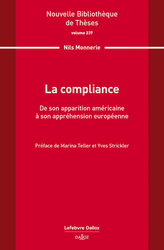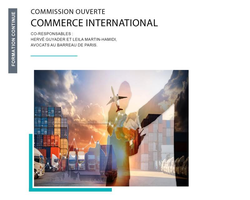Dec. 5, 2024
Thesaurus : Doctrine

► Full Reference: G. Wright & L. Chetcuti, US Extraterritoriality: The Trump Card, Institut Montaigne, Explainer, December 2024, 62 p.
____
____
📓read the English Summary of the Explainer
____
📓read the presentation of this Explainer made on the Institut Montaigne's website
____
► English Summary of the Explainer (done by the Authors): "Extraterritoriality — the application of national laws abroad — has grown exponentially over the last two decades. In a world characterized by strategic competition and weak international organizations, many countries are turning to law to secure their interests. None more than the United States.
There are good and bad uses of US extraterritoriality. It has become a key tool to uphold international law and to safeguard the US’ interests. It has helped to sanction hostile states and combat corruption, money laundering, organized crime and terrorism. It has helped to reduce excessive risk-taking by companies and has been used to manage US-China systemic rivalry. However, the US has also been accused of using it as a way to assert market dominance.
Could extraterritoriality be the next Trump Card the United States plays? During his first term, President Trump tightened export controls and expanded US laws to combat human rights abuses. At the same time, he rolled back banking regulations and asked his team to review US laws that created unnecessary red tape. Recently, he warned that he would remove any sanctions that weakened the dollar’s dominant position. The extent to which extraterritoriality is used to exert political pressure on EU countries is unclear.
The EU must be better prepared. Companies that fail to comply with US rules risk huge fines, handover of sensitive data and exclusion from the US market. European companies often prefer to comply with US rules, rather than abide by European measures designed to block their application. This poses a direct challenge to the sovereignty of the EU and its member states.
Institut Montaigne’s latest issue paper provides a framework for understanding all dimensions of US extraterritoriality and offers decision-makers and businesses a roadmap for an informed response. Understanding the implications of US extraterritoriality is crucial for governments and businesses, and should be integral to the EU's approach to economic security.".
________
Dec. 5, 2024
Thesaurus : Convention, contract, settlement, engagement

► Full Reference: M. Duchâtel & G. Wright, China’s Extraterritoriality: A New Stage of Lawfare, Institut Montaigne, Explainer, December 2024, 72 p.
____
____
📓read the English Summary of the Explainer
____
📓read the presentation of this Explainer made on the Institut Montaigne's website
____
► English Summary of the Explainer (done by the Authors): "Extraterritoriality - the application of national laws abroad - is gaining traction. In a world characterized by strategic competition and weakened international organizations, many countries are turning to law to secure their interests. This includes China.
Extraterritoriality has expanded under Xi Jinping. China no longer sees it as a relic of "the century of humiliation" during which foreign powers imposed consular jurisdiction on Chinese soil. Today, Chinese extraterritoriality has three aims: to defend against foreign interference and sanctions; to legitimize China’s foreign policy actions and strengthen its global influence; and as a way to deploy its public security agenda abroad.
China is also exploring a more offensive approach to extraterritoriality in the form of economic sanctions – though it has yet to use them. A more offensive use will depend on the willingness of the top leadership to employ such tactics during moments of international tension; a stronger international role for the renminbi and lower overall exposure to the dollar; and the countermeasures that third-countries could take to respond to Chinese extraterritorial norms.
The EU must act. Europeans need to understand the risks associated with Chinese extraterritoriality and plan accordingly. The EU should continue working with like-minded partners and be ready to deny access to the EU single market in case of abuse. Losing access to the single market would be deeply damaging to China’s interests and constitute a powerful deterrent for the EU.
Institut Montaigne’s latest issue paper provides a framework for understanding all dimensions of Chinese extraterritoriality and offers decision-makers and businesses a roadmap for an informed response. Understanding the implications of Chinese extraterritoriality is crucial for governments and businesses, and should be integral to the EU's approach to economic security.".
________
Nov. 15, 2024
Conferences

🌐follow Marie-Anne Frison-Roche on LinkedIn
🌐subscribe to the Newsletter MAFR Regulation, Compliance, Law
🌐subscribe to the Newsletter Surplomb, par MAFR
____
► Full Reference: M.-A. Frison-Roche, "Considérer la géographie pour réussir le Devoir de Vigilance" ("Taking Geography into account for a successful Vigilance Duty"), concluding speech in Devoir de vigilance, quelles perspectives africaines ? Regards croisés en droit international, droit comparé et droit OHADA (Vigilance Duty : what African perspectives? Cross-analysis of International Law, Comparative Law and OHADA Law), Institut de Recherche en Droit des Affaires et du Patrimoine (IRDAP), Bordeaux, 15 November 2024.
____
🧮see the full programme of this manifestation (in French)
____
► English summary of this concluding speech: This concluding speech was made "on the bench", i.e. directly after listening to all the day's speakers. It is not, therefore, based on an a priori conception of the subject, but on the impression that emerged from the whole, as one speaker followed another.
The general impression is that these compliance instruments, of which the vigilance tool is the spurred head, are only appropriate if they fulfill the purpose for which they were devised and imposed, which presupposes that they are appropriate to the concrete situations to which they apply: to the country, to the legislation that shapes and expresses this country, to its economy, to its population.
There is certainly room for improvement. But Vigilance legal instruments, like Compliance Law, are new mechanisms that are in the process of taking shape: we must seek to improve them and find solutions:
🧱🕴🏻mafr, 🚧Duty of Vigilance: the way forward, 2024
This is not easy, especially if we get lost in the jigsaw puzzle of texts and decisions in which the vigilance technique fits, particularly at French, European and international level:
🧱🕴🏻mafr, 🚧Vigilance, a piece of the European puzzle, 2023
Listening to all the many and varied speakers, it is clear that progress needs to be made to ensure that the Vigilance instrument takes greater account of the concrete situations reflected in the various legal systems of African countries, and in particular the unified OHADA legal system.
It can be done, as long as everyone is willing to bear it in mind.
🧱🕴🏻J.-B. Racine, 📝Geographical dominance in the choice and the use of compliance tools. Introductory remarks, in 🧱🕴🏻mafr (ed.), 📘Compliance Tools, 2021
The speakers demonstrated that the good feelings of Paris or Brussels can pave the way for African hell, for example when about the children labour. The same is true of the fight against corruption, as Mohamed Salah showed.
🧱🕴🏻M.M. Salah ,📝Conception and Application of Compliance in Africa, in 🧱🕴🏻mafr (ed.), 📘Compliance Tools, 2021
____
Meanwhile, listening to each other, it appears that often, despite using the same words, the speakers were not talking about the same thing, particularly not in terms of what the very term "Vigilance" refers to, the difference between the French and English being a challenge because "due diligences" are not the same than Vigilance duty . This is a sign that what we call a duty, or an obligation, or a spontaneous commitment, or a legal order criminally sanctioned, which are not at all the same thing, shows the immaturity of this notion of "Vigilance". What's more, we sometimes talk about the climate, or human rights, or the need to fight corruption or money laundering. These latter concerns are undoubtedly covered by texts classified under Compliance Law, some of which assert that Vigilance is the cutting edge, while others claim that Compliance is alien to or merely a component of Vigilance, because Vigilance embraces ethics, while Compliance is merely obedience to the norm ('conformity').
It is clear that the absence of an agreement on definitions is a handicap in practice, as we do not know which legal regime will apply. This uncertainty is problematic in practice because the regulations don't lay down definitions which alone make it possible to deduce the outline of the obligations of each party, particularly not those of the companies, which ask for instructions for use. Companies receive contradictory interpretations for the same situation, depending on who you are dealing with (a regulator or an NGO for example) or depending on the text (a text specific to the industrial activity, a text specific to the country, or a text from the country of the ordering company on the duty of vigilance, or a text from ordinary contract law or a text that will come from a soft law that remains rather mysterious).
This uncertainty feeds the passion that surrounds the issue of vigilance, with everyone speaking out, the specialists who want to talk about it being suspected of being a technocrat or captured, and those who don't speak out being the local population for whom others speak out.
As a result, two phenomena are set to persist, which we had hardly anticipated but which are set to increase: the contractualisation of all vigilance mechanisms and the jurisdictionalisation of all vigilance organisation.
____
The first phenomenon is the contracting of Vigilance. This contractualisation is the means by which companies have been carrying out their legal compliance obligations for years, using a contractual art that is becoming increasingly sophisticated.
We have very little information on these contracts, which are nonetheless what allow companies to obey the regulations and also to add to them, a combination of obedience and contractual freedom, the effects of which in practice have not yet been fully measured.
🧱🕴🏻mafr, 🚧Will, Heart and Calculation, the Three Traits Encercling the Compliance Obligation, 2024
🧱🕴🏻mafr (ed.), 📘Compliance and Contract, 2025
But they do raise essential questions. Firstly, they will bring back the jurisdiction of general courts , for example the commercial courts (tribunaux de commerce) in France, and the courts of the countries where the industrial operations take place: moreover, they are the natural route to international arbitration. They are a new type of contract, since they structure "value chains" (a managerial concept).
🧱🕴🏻mafr, 🚧Compliance Contract, Compliance Clauses, 2022
There are two key issues concerning these contracts: they directly concern African countries, their economic activity and their populations, as described throughout all the speeches.
The first is to know who governs the structural apparatus constituted by these 'regulatory contracts' through which chains of activity are built as durable structures. Who is strong and who is weak, between companies and states?
The second is to find out how much of the reality of the country and of local economic activity is taken into account by the subsidiary, and how much consideration is given to the local people involved: are the people who are actually involved really "taken into consideration" when we speak for them? Who is best placed to speak on their behalf, to defend them, to get to know them?
If we want to contextualise, refine and get to know the situation as closely as possible, in other words if we want to have definitions so that we know what we are talking about, but at the same time start from geographical and human realities, then it is the Judge who appears because the court starts from the facts.
____
This is the second phenomenon that has emerged and is set to increase: the jurisdictionalisation of Vigilance.
🧱🕴🏻mafr (ed.), 📘Compliance Jurisdictionalisation, 2023
This is understandable, since the judge is able to take cognisance of the facts, the situation in Uganda or Tanzania, and what is often referred to as the "extraterritoriality" of the Compliance mechanisms being thus compensated for.
However, the exclusive jurisdiction of the Paris Court of First Instance (decided in France by a 2021 law) may become more difficult, as it is even further away from Africa than the ordering company is. But it is precisely the contract judges who can be called upon to rule on the basis of Contract Law.
This central role of the judge raises a number of procedural difficulties that have either not yet been resolved, moreover are not still being perceive
🧱🕴🏻mafr (dir.), 🧮Le Droit processuel de la Vigilance (Vigilance Genreral Procedural Law), 2024
At the interface between procedure and substance, evidentiary issues require the development of a new evidentiary system. When the relevant facts are in Africa but the company accountable for them is in France under legislation adopted in Europe, this must be taken into account.
🧱🕴🏻mafr, 📝The Judge, the Compliance Obligation and the Company. The Compliance Evidence System, in 🧱🕴🏻mafr (ed.), 📘Compliance Jurisdictionalisation, 2023
What's more, since the Monumental Goal is to prevent, manage and detect risks, it is the future that is the main object of proof. A difficult subject by its very nature of the future, which calls for caution. Caution is to be expected from Judges, who may prefer the solution of an agreement: the contract and the commitment come back, for example through mediation, among the methods of conflict resolution.
But as close as possible to where it happens, OHADA's courts can then be called upon to hear States and populations.
What is more, in contractualisation (at which point the two major phenomena, contractualisation and jurisdictionalisation, enter into a dialectic), the clauses work together to activate the natural judge of the international contract, including vigilance clauses: the international arbitrator.
🧱🕴🏻L. Aynès, 📝How international arbitration can reinforce the Compliance Obligation, in 🧱🕴🏻mafr (ed.), 📘Compliance Obligation, 2025
OHADA has institutional arbitration mechanisms.
Now is the time to guide them so that they open up Africa to Vigilance and open up Vigilance to Africa.
In concrete terms.
________
April 18, 2024
Thesaurus : Doctrine

► Référence complète : N. Monnerie, La compliance. De son apparition américaine à son appréhension européenne, Dalloz, coll. "Nouvelle Bibliothèque de Thèses", vol. 237, 2024, 500 p.
____
____
📗lire le sommaire de l'ouvrage
____
📗lire la table des matières de l'ouvrage
____
► Résumé de l'ouvrage (fait par l'éditeur) : "Cette recherche est consacrée à l'émergence de la compliance dans la sphère juridique. À ce titre, elle constitue une des premières études transversales sur cette nouvelle notion.
Appliquée à l'encadrement du comportement des grandes sociétés, la compliance effraie tant qu'elle fascine, alors qu'elle a parfois été considérée comme un phénomène non juridique, une régulation hors du droit. L'intuition émaillant cet ouvrage soutient que la notion de compliance désigne un instrument juridique uniforme et fonctionnel. Enjeu majeur des entreprises et des organisations de tous secteurs, la compliance étend de plus en plus son champ et sa complexité. La mise en place d'un système de compliance efficace est un défi pour de nombreuses entreprises, qui doivent concilier exigences légales et réglementaires avec les contraintes opérationnelles et les objectifs économiques des sociétés. De leur côté, les États sont également confrontés à cet instrument au travers des sanctions prononcées par les autorités étrangères à l'encontre de sociétés domestiques.
L'ambition de cet ouvrage est de systématiser le processus de la compliance, d'analyser son incidence sur l'encadrement des sociétés, tout en appréciant l'opportunité de sa transplantation hors des États-Unis.
Une approche macro-comparative et historique démontre comment la compliance a fini par devenir un instrument permettant à l'État américain de déléguer le contrôle de l'application des normes substantielles. D'un instrument au service de la gestion du risque des sociétés, elle a fini par devenir un standard axé sur la prévention et la coopération. L'étude de l'exportation de la compliance révèle, au moyen de micro-comparaisons, que son arrivée en Europe résulte de l'application extraterritoriale du droit américain. Tout en démontrant qu'après avoir rejeté cette pratique, certains États ont décidé de recourir à une transplantation légale afin d'intégrer cet instrument dans leur ordre juridique.
L'ouvrage conclu en dressant plusieurs pistes de réflexion adressée aux autorités législatives afin de les aider à appréhender les difficultés inhérentes à la transplantation de la compliance.".
________
Oct. 2, 2023
Conferences

♾️follow Marie-Anne Frison-Roche on LinkedIn
♾️subscribe to the Newsletter MAFR Regulation, Compliance, Law
____
► Full Reference: M.-A. Frison-Roche, Participation à la Table ronde "Normes de Responsabilité Sociale des Entreprises (RSE & Devoir de Vigilance)" (Participation in the Round Table "Corporate Social Responsibility Standards (CSR & Duty of Vigilance)"), in Fribourg University, Journée du Droit, Fribourg University, Pérolles site, room C230, October 2, 2023.
____
🧮see the full programme of this event
🎥watch the video of this event (in French)
____
🌐read the report written in French with photos, tags and links on LinkedIn and also with links to each the speech
____
► General presentation of the event : This conference, build around 4 presentations and a debate between the speakers and then with the audience, aimed at explaining and understanding this fundamental movement and the new texts that express it in Switzerland, even if it is French law, such as the so-called 'Vigilance' law of 2017 and the draft European CS3D directive, because on the one hand it is a movement that begins with legal technique and on the other hand the texts in question are extraterritorial in scope, if only because of the notion of 'value chain'. In the first part of this round table, and to set the scene, I will outline the origin and content of the French 'Vigilance' law, the way in which the draft directive draws heavily on it, its relationship with Compliance Law, of which it constitutes the 'advanced point', and the decisive role it gives to the courts, in the general movement of the jurisdictionalisation of compliance. The purpose of this is to allow the discussion to get underway.
🕴️Idris Abdelkhalek, PhD candidate and lawyer, introduced the speakers and led the debate between them and the audience. He took questions from the audience on the intensity of the obligation weighing on companies, in particular between civil liability and criminal liability, between the obligation of means and the obligation of result, and on the way in which the duty of vigilance is applied to specific sectors such as defence.
____
► Presentation of my speech : the subject of which was Presentation of French Vigilance law, European perspective and European Compliance System. My presentation was divided into four points. Firstly, I outlined the state of Law in France, in the novelty represented by the 2017 law known as the "Vigilance" law, whose principles are simple and strong, principles that are situated in the aims pursued, and the way in which this law inspires what is currently being negotiated: the CS3D Directive.
Secondly, I stressed the need for companies to master these often technically complicated corpus, especially if we take into account the link between Vigilance and the CSRD directive on sustainability reporting and extra-financial information.
Thirdly, I have shown that an overall understanding can nevertheless be achieved, and that the technical nature of the 'tools' is better mastered if we place the duty of vigilance within Compliance Law, of which it constitutes the 'advanced point'. All of this anchors its legal normativity in the 'Monumental Goals' it serves, which in Europe are humanistic, since the aim is to protect, now but above all in the future because it is a branch of ex ante Law, the human beings involved in the systems (banking, finance, energy, digital, climate, etc.).
Fourthly, I emphasised that this understanding enables everyone to play their part: political and public authorities, businesses and stakeholders. Even more, and at the heart of the matter, the judge plays an essential role, even in countries with so-called 'continental' Law. I have used current cases as examples. This is just the beginning, and judges need to train, specialise and work in dialogue to achieve this.
____
► Presentation of the other speakers contributions :
🕴️Marion Paradas, Ambassador of France to Switzerland and Liechtenstein, opened the conference and gave a general presentation of the theme. Ambassador Marion Paradas presented the international challenge represented by Law, illustrated here by the duty of vigilance. She emphasised that this is a major issue, both now and in the future, for Swiss companies and French companies based in Switzerland, particularly as this duty extends throughout the "value chain" and in view of the CS3D directive, which will also have consequences for both.
🕴️Isabelle Chabloz Waidacher, Professor at the Faculty of Law in Fribourg and holder of the Chair of Economic Law at the University of Fribourg, gave a Presentation of Swiss Law. In particular, she emphasised the state of Swiss Law, which could have gone further than the 2017 French law known as the "Vigilance" law if the popular initiative reference had led to the adoption of a law, and which currently focuses more on information and transparency obligations, with CSR taking over from there. But she stresses that the reality of value chains will force Swiss companies to take into account the requirements of the European directive currently being adopted.
🕴️Renaud Roussel, Managing Director of Colas Switzerland, presented an entrepreneurial view of the subject. He began by outlining the concrete steps taken by his industrial group in Switzerland and around the world to implement its commitments to protect the environment, for example by ensuring the proper use of materials used in road construction. He also stressed the importance of human rights, particularly in labour relations, in the context of CSR and vigilance. He went on to point out that it was not always easy for a large company to meet its own requirements, or the requirements imposed on it by the law, because in the construction and public works sector in particular it is often small companies that are competing, competitors who do not bear the costs of such obligations.
________
April 13, 2023
Conferences

♾️ suivre Marie-Anne Frison-Roche sur LinkedIn
♾️s'abonner à la Newsletter MAFR Regulation, Compliance, Law
____
► Référence complète : M.-A. Frison-Roche, participation à la Table-Ronde sur La dynamique du Droit de la compliance, avec Clara Ingen-Housz, chief ethics and compliance officer, antitrust group legal counsel Saint-Gobain, et Hervé Guyader, avocat à la Cour et responsable de la commission Commerce international de l'Ordre des avocats du Barreau de Paris, Maison du barreau, 13 avril 2023.
____
____
présentation de l'intervention :
Sept. 1, 2022
Thesaurus : Doctrine

► Full Reference: B. Deffains, "L’enjeu économique de compétitivité internationale de la compliance" ("The economic challenge of international competitiveness of Compliance"), in M.-A. Frison-Roche (ed.), Les Buts Monumentaux de la Compliance, coll. "Régulations & Compliance", Journal of Regulation & Compliance (JoRC) and Dalloz, 2022, p. 355-366.
____
📕read a general presentation of the book, Les Buts Monumentaux de la Compliance, in which this article is published
____
► Summary of the article (done by the Author, translated by the Journal of Regulation & Compliance) : "Compliance", which can be define as obedience to the regulations is a stake for the company in that it can choose as a strategy to do it or not to do it, according to what costs it and brings it such a choice. This same choice of understanding is offered to the author of the norm, the Legislator or the Judge, even the entire legal system making regulation more or less expensive, and compliance with it for businesses. So when the French law known as “Vigilance law” was adopted in 2017, the French Parliament was criticized for dealing a blow to the “international competitiveness” of French companies. ”Today, it is on its model that the European Directive is conceived. The extraterritoriality attached to Compliance Law, often presented as an economic aggression, is nevertheless a consubstantial effect, with its desire to claim to protect beyond borders. , coming us back to a classic question in Economics: what is the price of virtue?
To fuel a debate that began a few centuries ago, it is on the side of the issues that the analysis must be made economically. Indeed, Compliance Law is not only located in Ex Ante, to prevent, detect, remedy, reorganize the future, but also claims to face more "monumental" difficulties than traditional branches of Law. And it is concretely by examining the new instruments that Compliance Law has put in place and offered or imposed on companies that the question of international competitiveness must be examined. The mechanisms of information, secrecy, accountability or responsibility, which have a great effect on the international competitiveness of companies and systems, have changed and their measure has not yet been taken.
________
May 4, 2022
Thesaurus : Soft Law

► Référence générale : Haut Comité juridique de la place financière de Paris, Rapport sur l'extraterritorialité du Droit de l'Union européenne, mai 2022.
____
_____

Oct. 22, 2021
Publications

 ► Référence complète : Frison-Roche, M.-A., Le principe de proximité systémique active, corolaire du renouvellement du Principe de Souveraineté par le Droit de la Compliance, document de travail, octobre 2021
► Référence complète : Frison-Roche, M.-A., Le principe de proximité systémique active, corolaire du renouvellement du Principe de Souveraineté par le Droit de la Compliance, document de travail, octobre 2021
____
🎤 Ce document de travail avait été élaboré pour servi de base à l'intervention de clôture du colloque Effectivité de la Compliance et Compétitivité internationale, coorganisé par le Journal of Regulation & Compliance (JoRC) et le Centre de recherche en Droit et en Économie de l'Université Panthéon-Assas (Paris II), se tenant le 4 novembre 2021, Salle des Conseils, Université Panthéon-Assas (Paris II).
🚧Il était corrélé à un premier document de travail ayant pour thème l'Appréciation du lancement d'alerte et de l'obligation de vigilance au regard de la compétitivité internationale, élaboré également pour ce colloque.
La gestion du temps n'a permis que la prise de parole sur ce thème-ci relatif aux techniques juridiques du lancement d'alerte et de l'obligation et devoir de vigilance.
____
📝Ce présent document de travail a donc été ultérieurement utilisé pour constituer la base d'un article, Le principe de proximité systémique active, corolaire du renouvellement du Principe de Souveraineté par le Droit de la Compliance, lequel est publié⤵
📕dans sa version française dans l'ouvrage Les buts monumentaux de la Compliance, dans la collection 📚 Régulations & Compliance
📘dans sa version anglaise dans l'ouvrage Compliance Monumental Goals, dans la collection 📚 Compliance & Regulation
____
► Résumé du document de travail : Les rapports entre le Droit de la Compliance et la notion de Souveraineté sont abîmés par une mauvaise querelle de départ, souvent appelée celle de "l'extraterritorialité du Droit de la Compliance", elle-même qualifiée en tant que telle comme une attaque à la Souveraineté des Etats, une sorte de guerre contre cette sorte de population civile que sont "ses" entreprises, frappées par des sanctions économiques. Dans une confusion juridique générale, oscillant entre panique et rage, entre le cas pourtant si particulier des embargos décrétés par un Etat contre un autre, une contamination s'est faite avec la question plus vaste des sanctions économiques internationales, puis avec le Droit de la Compliance, lui-même réduit ainsi à n'être qu'une petite partie du Droit pénal international.
Le Droit de la Compliance, présenté comme outil masqué de guerre entre Etats, en a été d'une part profondément dénaturé. D'autre part, toutes les forces ont été mobilisées pour "réagir" et frapper en retour ou à tout le moins "bloquer", ou, si l'on ne pouvait rien faire d'autre, recopier l'arsenal, limitant la Compliance à la question de la corruption.
C'était réduire le Droit de la Compliance à peu, alors que nous avons tant besoin de sa force et qu'il exprime au contraire la puissance du Juridique lui-même dans un espace supra-national où les Etats sont peu présents. Ils sont peu présents parce que le territoire lui-même s'y dérobe et que les Etats demeurent liés au territoire. Or, la finance, le numérique et le spatial, ces grands enjeux de Régulation ont besoin de limites, parce que les êtres humains, même faibles, ne doivent pas être broyés par plus forts qu'eux. Non, la civilisation, essentiellement liée à la limite, ne doit pas se perdre dans ces nouveaux espaces.
Or, la Souveraineté ne s'exprime pas dans la toute-puissance, ce sont les petits-enfants et les tyrans qui pensent cela. Elle s'exprime dans la limite, que le sujet se donne et qu'il donne. Le Droit de la Compliance, prolongeant en cela le Droit de la Régulation, est ce qui est en train de donner des limites à ces trois espaces sans territoire que sont la finance, le numérique et le spatial. En ce qu'il appréhende directement les risques globaux qui se jouent des territoires, par exemple le risque climatique. En ce qu'il limite les discours de haine qui nie l'idée de civilisation dans l'espace numérique. En ce qu'il se saisit directement de l'avenir. En ce qu'il noue directement une alliance entre les Autorités politiques et les Opérateurs cruciaux en Ex Ante
C'est pourquoi sur la base du Droit de la Compliance l'Europe numérique souveraine s'élabore, l'industrie d'un cloud souverain se construit. Ainsi le Droit de la Compliance n'est pas l'ennemi de la Souveraineté, c'est le contraire : il est ce par quoi la Souveraineté va se déployer dans un monde qui doit se penser sans territoire en mettant pourtant le projet politique en son cœur.
Pour cela il faut construire un nouveau principe, qui est l'inverse de la fermeture et de l'exclusion, correspondant au projet de l'Europe souveraine : celui de la "proximité systémique active.
____
Lire ci-dessous les développements⤵️
June 29, 2021
Thesaurus : Soft Law

► Référence complète : Assemblée Nationale, Bâtir et promouvoir une souveraineté numérique nationale et européenne, Rapport d'information, Warsmann, J.-L., (prés.) et Latombe, Ph., (rapp.), 29 juin 2021 (2 t.).
___
____
June 17, 2021
Thesaurus
Référence complète : Valluis, B., Etats-Unis : les lois d'un empire sans frontières, in Abis, S., Le Déméter 2021, 2021, p.265-280.
____
Valluis, Bernard. « États-Unis : les lois d’un empire sans frontières », Sébastien Abis éd., Le Déméter 2021. IRIS éditions, 2021, pp. 265-280.
Oct. 14, 2020
Teachings : Compliance Law

Résumé de la leçon.
Le Droit de la Compliance semble être synonyme d"extraterritorialité, en ce qu'il se fit connaître d'une façon spectaculaire en 2014 par la décision américaine sanctionnant la banque française BNPP. L'on a dès lors souvent assimilé "Compliance" et extraterritorialité du Droit américain, englobant les deux dans la même opprobre.Celle-ci est par exemple d'une grande violence dans le rapport dit "Gauvain" de 2019. Mais sauf à croire que le Droit n'est que l'instrument pur du Politique, en raison des "buts monumentaux" poursuivis par le Droit de la Compliance, celui-ci ne peut avoir en tant qu'instrument qu'une portée extraterritoriale, sauf à être utilisé par une Autorité locale pour ne servir qu'un but local. Dans cette hypothèse, précise et restreinte, l'extraterritorialité du Droit de la Compliance doit être combattue, ce qui est fait par la Cour de la Haye dans sa jurisprudence de 2018. Mais pour résoudre cette question particulière, l'on risque de détruire l'idée même de Droit de la Compliance, lequel suppose l'extraterritorialité. Et au moment même où le continent asiatique est en train d'utiliser le Droit de la Compliance dans une définition mécanique pour mieux s'isoler.
Si l'on prend les autres sujets sur lesquels porte le Droit de la Compliance, lequel excède la question des embargos, l'on peut même soutenir qu'il a été fait pour ne pas être brider par les territoires, lesquels sont à la fois l'ancrage des Etats et leur intrinsèque faiblesse. L'internalisation dans les entreprises permet cela. Elle le permet tout d'abord par le mécanisme de "l'autorégulation". En effet, si l'on fait un lien, voire une identification entre la Compliance, l'éthique et l'autorégulation, alors la question des frontières ne se pose plus. Ainsi, l'entreprise s'auto-instituant non seulement comme un "néo-constituant" mais comme un ordre juridique complet, y compris dans le règlement des différents et dans les voies d'exécution (enforcement par le bannissement). La question de l'efficacité est donc réglée mais ouvre alors celle de la légitimité. C'est pourquoi l'Europe a vocation à porter une conception extraterritoriale d'une définition pourtant européenne de ce qu'est le Droit de la Compliance. C'est ce à quoi les arrêts de la Cour de justice de l'Union européenne du 24 septembre 2019 viennent de mettre un coup d'arrêt.
Se reporter à la Présentation générale du Cours de Droit de la Compliance.
Consulter le Dictionnaire bilingue du Droit de la Régulation et de la Compliance et la Newsletter MAFR - Law, Compliance, Regulation.
Consulter la Bibliographie générale du Cours de Droit de la Compliance
Consulter la bibliographie ci-dessous, spécifique à cette Leçon relative aux enjeux pratiques du Droit de la Compliance

March 22, 2020
Publications

This working paper is the basis for an article in the French Law Journal Le Clunet.
When we compare the terms "Compliance" and "Extraterritoriality", it is often with dissatisfaction, even anger and indignation. On the momentum, after having expressed a principle of disapproval of such a merger, attention is focused on how we can fight against it, to break the link between Compliance and Extraterritoriality. But do we have to go so fast? Is this negative initial assessment correct?
Indeed, thus gone, it is frequently explained that the binding mechanisms of Compliance are suffered, that they come from abroad!footnote-1750, that they apply with efficiency but in an illegitimate way, without agreement of the one who must submit to it, whose resistance is therefore certainly ineffective but nevertheless justified. In the same spirit, when we start to shell the cases, like so many scars, sort of rosary, even crown of thorns, BNPP case!footnote-1718, Astom case!footnote-1717, etc., the wounds not yet closed turn into reproaches made against the rules, public authorities, even reproaches made against named people.
We are leaving this kind of complaint against X, which targets what would be this appalling "Compliance", this Law which would be both hostile and mechanical which would not have been able to stay within the limits of borders, Compliance being thus placed in contrast to sovereignty and protection, which presuppose staying within its limits!footnote-1716 and being able to protect companies from abroad. More concretely, this presentation targets more directly the United States, which uses "the legal weapon", slipped under what is then designated as "the artifice of the Law" with extraterritorial scope. But this effect would in reality be the very object of the whole: their hegemonic will to better organize at least a global racket, notably through the Foreign Corrupt Practices Act (FCPA) and at best a world government through notably the embargoes.Those who believed otherwise would be naive or foolish. This silences the opponents because who likes this costume? So the world would be put in a ruled cut; what the mafia could not have done, Compliance Law would have obtained, offering the whole world to the United States thanks to the extraterritoriality of its national Law.
Compliance Law would thus become the very negation of Law, since it has the effect, even the purpose (barely concealed by strategic, powerful and shameless States), of counting borders for nothing, whereas Public International Law, in that it is built between the sovereign subjects of law that are the States presupposes the primary respect for borders to better exceed them while Private International Law takes the same postulate to better welcome foreign Law in situations presenting a foreign element!footnote-1726. Jurists believed in the force of Law; by Compliance, we would return to the sad reality that only the powerful, here the United States, dominate and - ironically - it is under the pretext of Law that they do it. It would be necessary to be well duped, or accomplice, to see there still legal where there is only the balance of powers. When one is more intelligent or skilful than that, one understands that the "small" can only be "subject" to the Compliance Law, one would have to be powerful to be the normative source and its enforcement agent. It is then towards this mis-named Department of Justice (DoJ) that the fearful, hateful and resigned glances turn.
If you see it that way, what should you do then? The answer is obvious: react!
It is necessary to save the sovereignty, France, companies, the Law itself. If that is how the question is posed, how can we disagree? It is therefore necessary to destroy the Compliance Law and the extra-territoriality of American Law which had found this "Trojan horse", an expression so frequently used. This is the basis for the administrative reports available, for example the Berger-Lellouche!footnote-1719 parliamentary reports and the Gauvainfootnote-1720 report. Both of them broadly develop the two preceding claims, namely that the extra-priority of compliance mechanisms is illegitimate and harmful, since it is a mechanism invented by the Americans and harming the Europeans, or even invented by the Americans to harm Europeans, the description being made in much more violent terms than those used here. The description seems acquired, the reflections therefore relate to the remedies. The reaction is most often to "block" the Compliance Law in its extraterritorial effect.
But without discussing the effectiveness of the remedies proposed downstream, it is necessary to return to this description so widely shared made upstream. Because many elements on the contrary lead to affirm that ComplianceLaw first of all and by nature can only be extraterritorial and that it must be. Whether or not the State in which it was created has malicious intentions. The description which is made to us most often describes particular cases from which we draw generalities, but we cannot reduce Compliance Law to the already cooled cases, as BNPP case, or to the always hot case of the American embargo on Iran. Furthermore, one cannot take the issue of embargoes and draw conclusions, legitimate for it, but which would apply to the whole of Compliance Law. The fact that theCompliance Law is a branch of Law at the stage still of emergence can lead to this confusion which consists in taking the part for the whole, but it is very regrettable because what is justified for the embargoes does not is in no way relevant for all Compliance Law, of which precisely the Law of embargoes is only a small part, even an abusive use. This overlapping is not often perceived, because the definition of Compliance Law and its criterion are not clearly enough defined, namely the existence of a "monumental goal"!footnote-1725, which does not exist in an embargo decided unilaterally by an order decreed by the President of the United States, but which exists in all other cases and fully justifies extraterritoriality, extraterritoriality which is even consubstantial with Compliance Law (I).
Once we have distinguished the embargoes, as an atypical, sometimes even illegitimate part, of Compliance Law, we should continue this work of distinction by emphasizing that the United States has certainly invented Compliance Law!footnote-1721 but only developed a mechanical concept for the prevention and management of systemic risks. Europe has taken up this systemic conception of the protection of systems, for example financial or banking, but superimposed another conception, drawing on its deep humanist tradition!footnote-1722, whose protection of personal data is only an example and whose monumental goal is the protection of the human being. This primary concern then justifies the European use of Compliance mechanisms to interfere with global objects regardless of their location, especially the environment, and to block the entry onto the ground of objects that enter, which is contrary to Competition Law but builds a legitimate barrier under this Compliance Law, in the indifference of an extraterritorial origin (II).
Indeed, this branch of the new Law which is Compliance Law is not reducible to Competition Law!footnote-1723, any more than it is not reducible to a method. It is a substantial, extraterritorial Law because the "monumental goals" which give it substantial unity are extraterritorial. This can directly contribute to the future of a Europe which on the one hand will be able to pursue, in an extraterritorial manner, monumental humanist goals, in the field of the environment or the protection of personal information or access to the Law (in particular by the technique of compliance programs) and which, on the other hand, by the techniques of traceability of products!footnote-1724, will have the means not to bring in products manufactured in an indecent manner, except in countries which do not grant value than in Competition Law to enter the WTO.
Read the developments below.

Nov. 27, 2019
Publications

This Working Paper served as the basis for an intervention in the conference organized in the conference cycle organized by the Journal of Regulation & Compliance (JoRC) on the theme: Compliance Tools, in collaboration with many university partners: this first conference is organized in collaboration with the Sciences po Economics Department and is held on November 28, 2019 at Sciences po and deals with the more specific theme of Risk mapping.
It also serves as the basis for the book edited by Marie-Anne Frison-Roche, Compliance Tools, which will be released in the Regulations & Compliance collection.
______
Is the consideration by Law of the Risk Mapping mechanism so new?
At first glance yes, and one might even be surprised at this novelty, since this rational anticipation of risks should have been recognized for a long time. But this is perhaps due to the more general fact that Risk itself has only recently become an autonomous legal object in Economic Law, in particular because Risk does not have at all the same position in Competition Law and in Regulation Law (I) .. Its position is even opposed in the both, Risk becoming central in Regulation Law. Compliance Law being the extension of Regulatory Law, it is also built on the "concern" of Risk and the internalization of this consideration in enterprises therefore takes the form of mapping.
A closer look maybe not,even before the specific French laws, called "Sapin 2" and "Vigilance" and beyond them, case law decisions giving a general scope to maps drawn up by operators, or increasing the obligation that 'they have to do it (II). In this, general and precise technical Law offers points of support for Compliance Law, strengthening it in its tools.
March 5, 2016
Thesaurus : Soft Law
Référence complète : Lellouche, P. et Berger, K., L'extraterritorialité de la législation américaine, Rapport Assemblée Nationale, 2016.
____
____
Plan du rapport :
INTRODUCTION 9
I. L’EXTRATERRITORIALITÉ : LA PERCEPTION EXTERNE D’UN « NON-PROBLÈME » DU POINT DE VUE AMÉRICAIN 13
A. L’EXTRATERRITORIALITÉ, QUESTION DE POINT DE VUE
1. Vues d’Europe, de nombreuses lois ou réglementations américaines « extraterritoriales »
2. Mais du point de vue américain, la plupart ne sont pas extraterritoriales
B. UNE CERTAINE CONCEPTION DU RÔLE DU DROIT
1. Le droit comme instrument de puissance économique et de politique étrangère
a. Le droit mis au service des objectifs de la politique étrangère et des intérêts économiques des États-Unis
b. … et aussi au service direct des intérêts des firmes américaines ?
c. La mobilisation des moyens policiers et de renseignement américains au service de la politique juridique extérieure
2. Mais un droit américain qui ne saurait être l’objet d’une négociation internationale
C. DES CONTRADICTIONS AGGRAVÉES PAR LE BLOCAGE ACTUEL DU SYSTÈME POLITIQUE
II. LES ENJEUX DE L’EXTRATERRITORIALITÉ DE CERTAINES LOIS AMÉRICAINES 27
A. LES ENJEUX ÉCONOMIQUES ET FINANCIERS
1. Des pénalités considérables et en forte croissance, qui, de fait, frappent très souvent les entreprises européennes
a. Les pénalités pour corruption internationale d’agents publics
b. Les pénalités pour non-respect des sanctions économiques américaines
2. Le doute sur l’équité : des entreprises européennes particulièrement ciblées ?
a. Les pénalités pour corruption internationale
b. Les pénalités pour non-respect des embargos et/ou de la législation anti-blanchiment
3. Un prélèvement sur les économies européennes
4. Une donne nouvelle : le poids croissant des économies émergentes et de leurs entreprises
B. LES ENJEUX POLITICO-DIPLOMATIQUES : LE RISQUE D’EFFETS CONTRE-PRODUCTIFS, Y COMPRIS DU POINT DE VUE AMÉRICAIN
1. Le mécontentement des pays tiers et même des alliés des États-Unis
2. Une fragilisation potentielle du rôle international du dollar et du système financier international
3. La difficulté à régler finement les politiques de sanctions : le cas de l’Iran 38
III. L’ANALYSE JURIDIQUE DE L’EXTRATERRITORIALITÉ DES LOIS AMÉRICAINES 41
A. LES FONDEMENTS GÉNÉRAUX DES LÉGISLATIONS À PORTÉE EXTRATERRITORIALE 41
1. Le droit américain 41
2. Le droit français et européen 42
a. En matière pénale 42
b. En matière civile et commerciale 43
B. LA PRATIQUE : LES PRINCIPALES « ENTRÉES » DES LOIS AMÉRICAINES EXTRATERRITORIALES 45
1. Les lois qui s’appliquent à toutes les sociétés présentes sur les marchés financiers réglementés américains 46
a. La lutte contre la corruption internationale 46
b. Un autre exemple, la loi Sarbanes-Oxley 48
2. La lutte contre le blanchiment d’argent d’origine criminelle : une législation qui impose aux banques américaines de contrôler leurs correspondants étrangers 48
3. Les autres cas de figure (violations de sanctions économiques, lutte contre les organisations mafieuses, fiscalité personnelle) : plutôt une conception « extensive » des principes généraux de compétence territoriale et/ou personnelle ? 49
a. Les sanctions économiques et embargos 49
i. Des sanctions qui peuvent être ouvertement extraterritoriales 49
ii. Une dimension de « sécurité nationale » susceptible de « justifier » une extraterritorialité débridée 50
iii. Mais des pénalités contre les banques européennes plutôt fondées sur une interprétation très extensive du critère de rattachement territorial via l’usage du dollar 50
b. La lutte contre le crime organisé (loi RICO) : une volonté de sanctionner globalement les organisations mafieuses qui permet une territorialité « large » 53
c. La fiscalité : l’emploi large du critère de compétence personnelle à côté du critère territorial 53
4. La question particulière de la remise en cause des immunités souveraines 54
C. LES PRATIQUES AMÉRICAINES DE POURSUITE S’APPUIENT SUR DES CRITÈRES INCERTAINS, DES MÉTHODES INTRUSIVES, VOIRE ABUSIVES 56
1. Des critères de compétence territoriale ou personnelle pour le moins incertains 57
a. Le problème de l’implication des « US Persons » 57
b. Des définitions législatives ou plus vraisemblablement jurisprudentielles ? 58
c. Quelle accessibilité du droit ? 58
2. Le problème de l’incidence des méthodes de l’administration et de la justice américaines : de l’extraterritorialité d’édiction à celle d’exécution 59
a. Des méthodes très intrusives 59
b. La loi FATCA, exemple d’option pour une méthode de recueil d’informations intrusive et sans limite de territorialité 60
c. De multiples administrations et agences américaines impliquées : le partage du butin 61
d. La menace de sanctions très lourdes et imprévisibles qui contraint à transiger et à renoncer à la voie judiciaire 62
e. Pourtant, en cas de procès, une justice américaine assez prudente sur l’extraterritorialité 64
i. La jurisprudence récente de la Cour suprême 64
ii. Les jugements sanctionnant certains abus de l’application de la loi FCPA 66
f. Les autres conséquences du recours aux transactions 67
i. Les engagements de conformité et de contrôle 67
ii. Les engagements de non-recours et de silence 70
D. L’APPLICATION EXTRATERRITORIALE DES LOIS AMÉRICAINES EN CAUSE EST-ELLE CONTRAIRE AU DROIT INTERNATIONAL ? 71
1. L’extraterritorialité d’édiction n’est pas en soi contraire au droit international 71
2. D’autres pays ou entités adoptent des législations ou des jurisprudences extraterritoriales 72
a. L’Union européenne 72
i. Les règlements européens de sanctions économiques : un champ bien délimité mais potentiellement extraterritorial 72
ii. Des jurisprudences parfois peu exigeantes quant au lien nécessaire pour imposer une règle européenne hors du territoire communautaire 73
b. La multiplication des législations anti-corruption à portée plus ou moins extraterritoriale 74
3. Le débat sur la conformité au droit international des législations américaines en cause 77
a. Le passé : l’exemple topique de la loi Helms-Burton 77
b. Les lois FCPA et FATCA : des textes confortés par leur inscription dans une démarche internationale partagée 77
c. Des mesures de sanctions et d’embargo en contrariété avec les règles de l’Organisation mondiale du commerce ? 79
IV. UNE SITUATION POLITIQUE ET JURIDIQUE EN FRANCE ET EN EUROPE NE POSANT PAS DE LIMITES À L’EXTRATERRITORIALITE DES LOIS AMERICAINES 81
A. L’ABSENCE DE POLITIQUE « CONVAINCANTE » DE RÉPRESSION DE LA CORRUPTION INTERNATIONALE POUVANT LIMITER L’INTRUSION EXTRATERRITORIALE AMÉRICAINE 81
1. Une possible limitation de l’intrusion américaine par le « partage » coopératif et l’application du principe non bis in idem 81
a. La convention OCDE de 1997 : un appel explicite au « partage » coopératif des procédures entre juridictions 81
b. La jurisprudence française : vers une reconnaissance élargie du principe non bis in idem dans le cas de procédures étrangères 82
c. La position américaine : aucune garantie que des poursuites parallèles ne soient engagées 84
2. Un droit français incapable d’engendrer une coopération et des poursuites coordonnées 87
a. Le constat : jusqu’à présent, des condamnations peu nombreuses, tardives et d’une sévérité modérée 87
b. Un renforcement du dispositif engagé en 2013 88
B. UNE RECONNAISSANCE FRANÇAISE DE L’APPLICATION DU FATCA AUX EFFETS SECONDAIRES NÉFASTES : LE PROBLÈME DES « AMÉRICAINS ACCIDENTELS » 89
1. Le choix ancien d’une politique coopérative 89
a. La convention fiscale bilatérale 89
b. L’accord « FATCA » 90
2. L’application très insatisfaisante de la convention fiscale bilatérale : les « Américains accidentels », des français victimes de son application 91
C. DES EMBARGOS ET SANCTIONS INTERNATIONALES PRINCIPALEMENT EUROPÉENS MAIS APPLIQUÉS ET SANCTIONNÉS AU NIVEAU NATIONAL 93
1. Des sanctions adoptées majoritairement au niveau européen 93
2. L’état du droit : la violation d’embargo est généralement une infraction douanière 94
3. Les sanctions concernant l’Iran : une politique de coordination coopérative décevante 96
a. Les enjeux de l’accord sur le nucléaire iranien 97
b. Une bonne volonté de principe de l’exécutif américain 98
c. Cependant, un dispositif qui reste entaché d’interrogations paralysantes pour les entreprises européennes 98
d. Le maintien de l’essentiel des sanctions « primaires » américaines, y compris sur la compensation des opérations en dollars via le système financier américain 99
e. Le problème des « lettres de confort » 102
f. La « guerre psychologique » 103
g. Les contre-arguments américains 103
4. L’inefficacité des « lois de blocage » 104
a. Un dispositif français utile mais mal adapté pour se protéger contre le caractère invasif de la justice américaine 104
b. Le règlement européen de 1996 à rénover 107
V. LES RECOMMANDATIONS DE LA MISSION: JOUER À ARMES ÉGALES 109
A. EXIGER LA RÉCIPROCITÉ ET SE DOTER D’ARMES ÉGALES POUR IMPOSER DES POLITIQUES COOPÉRATIVES 110
1. Le projet de loi relatif à la transparence, à la lutte contre la corruption et à la modernisation de la vie économique : être à armes égales dans la lutte contre la corruption internationale 110
2. Les solutions envisagées au problème des « Américains accidentels » 112
B. LES EMBARGOS ET SANCTIONS ÉCONOMIQUES : UN RENFORCEMENT DES MOYENS EUROPÉENS ET UNE CLARIFICATION DIPLOMATIQUE INDISPENSABLE AVEC LES ÉTATS-UNIS 114
1. La possibilité de rendre les dispositifs plus efficaces et transparents en s’inspirant des pratiques américaines 114
a. Le projet de loi relatif à la violation des embargos et autres mesures restrictives 114
b. Vers un « OFAC européen » ? 115
2. Une demande de clarification du régime des sanctions concernant l’Iran 117
3. Les options de confrontation 119
a. Les précédents 119
i. L’affaire du gazoduc sibérien 119
ii. Les lois Helms-Burton et d’Amato-Kennedy 119
b. Saisir l’Organisation mondiale du commerce ? 120
c. Le renforcement des « lois de blocage » 121
4. Les stratégies de contournement : promouvoir l’euro, privilégier les cotations boursières en Europe, … 122
C. LES OUTILS NECESSAIRES : SE DOTER DES MOYENS POUR ÊTRE « À ARMES ÉGALES » 124
1. En matière de renseignement économique 124
2. En matière d’organisation judiciaire et d’outils juridiques 127
D. UNE AUTRE PISTE DE COOPÉRATION : LES NÉGOCIATIONS INTERNATIONALES, NOTAMMENT CELLE DU PARTENARIAT TRANSATLANTIQUE, OFFRENT-ELLES DES OPPORTUNITÉS D’AVANCER ? 12
________
June 15, 1977
Thesaurus : 7. Textes étrangers
Full reference: Foreign Corrupt Practices Act, Public Law 95-213, Dec. 19, 1977